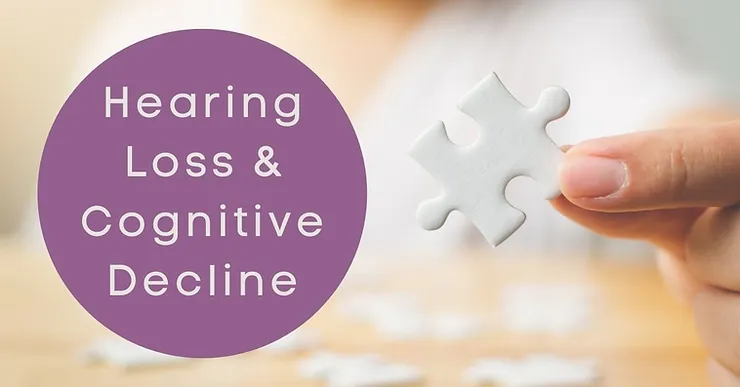
Today, dementia is an increasingly growing global health concern that directly impacts over 50 million people. Dementia is a form of cognitive decline which ranges from mild to severe and refers to one’s ability to make decisions, remember, learn, concentrate etc. There are no medical treatments that can prevent or stop the development of dementia so identifying potential factors that contribute to this medical condition is crucial. Early detection of cognitive decline can help establish effective treatment and management which becomes more difficult during later states of dementia.
There is substantial research that focuses on the relationship between hearing loss and cognitive decline. This growing research has shown a link between the two and suggests that untreated hearing loss contributes to cognitive decline. To highlight some of these findings, let’s delve into the research!
Link Between Hearing Loss & Cognitive Decline
Hearing loss is the third most common chronic health condition among older adults. According to the National Institute on Deafness and Other Communication Disorders:
-
25% for adults ages 65-74 have hearing loss
-
50% for adults ages 75 and older have hearing loss
Additionally, more than 47 million people have dementia and 5 million people specifically have Alzheimer’s which is the most severe form of dementia. According to the Alzheimer’s Association, this includes:
-
1 in 10 people above the age of 65 (10%)
-
80% are 75 and older
These statistics highlight the prevalence and scope of hearing loss and cognitive decline which inevitably overlap.
Research
There are numerous studies that explore this overlapping of hearing loss and cognitive decline. This includes the following studies:
-
2019 Study, Brigham and Women’s Hospital and Harvard Medical School
-
Study: researchers analyzed data collected by an 8-year health study of 10,107 men ages 62 and higher. Participants reported their hearing status and cognitive ability.
-
Findings: show not only that cognitive decline was more likely with hearing loss but also that that the more severe the hearing loss, the greater the risk of cognitive decline which was:
-
30% higher among people with mild hearing loss
-
42% higher among people with moderate hearing loss
-
54% higher among people with severe hearing loss
-
2013 Study, Johns Hopkins
-
Study: researchers evaluated hearing loss and cognitive impairment for 1984 older adults. Using hearing and cognitive tests at measurements, researchers collected this information over the course of 6 years.
-
Findings: researchers found that hearing loss accelerated cognitive decline. This includes:
-
people with mild hearing loss were 24% more likely to experience cognitive impairment
-
people with more severe hearing loss were 41% more likely to experience cognitive impairment
The findings from these studies reveal a strong correlation between hearing loss and cognitive decline. It broadly shows that the more significant the hearing loss, the higher the risk of cognitive decline. Researchers have suggested that hearing loss reduces the ability of the parts of the brain responsible for our auditory system. Brain cells involved in muscle control and sensory perception may be less active as a result which affects cognitive functioning.
Delaying Cognitive Decline by Treating Hearing Loss
In addition to contributing to cognitive decline, untreated hearing loss can have devastating effects including: increased risk of accidental injuries, development of other medical conditions, unemployment or underemployment, fatigue, and social withdrawal. Early detection and treatment of hearing loss can help you transition to better health with greater ease. Addressing hearing loss is relatively simple and involves scheduling an appointment to have your hearing assessed by a hearing healthcare specialist.
Hearing tests determine any impairment, the degree, and specific type of hearing loss that you may be experiencing. Fortunately, there are effective ways to treat hearing loss that drastically improve a person’s ability to hear. The most common treatment is hearing aids which are small electronic devices that are designed to absorb, amplify, and process sound. Growing research continues to show that using hearing aids improves brain function, delaying cognitive decline. Additionally, hearing aids have experienced much technological innovation and can be easily integrated in one’s life which allows you to fully participate and engage in the activities, relationships, and quality time that enhances life!
